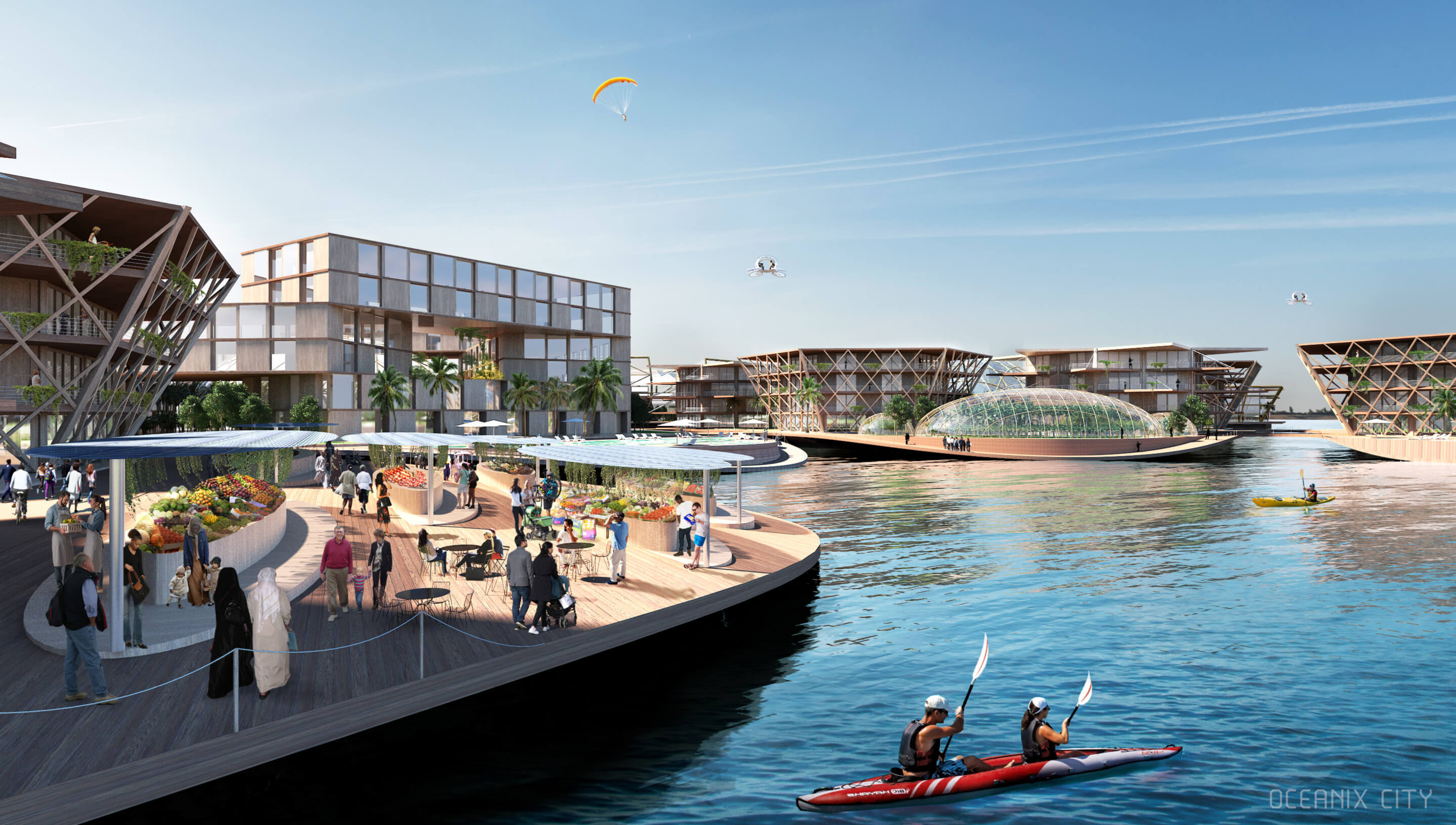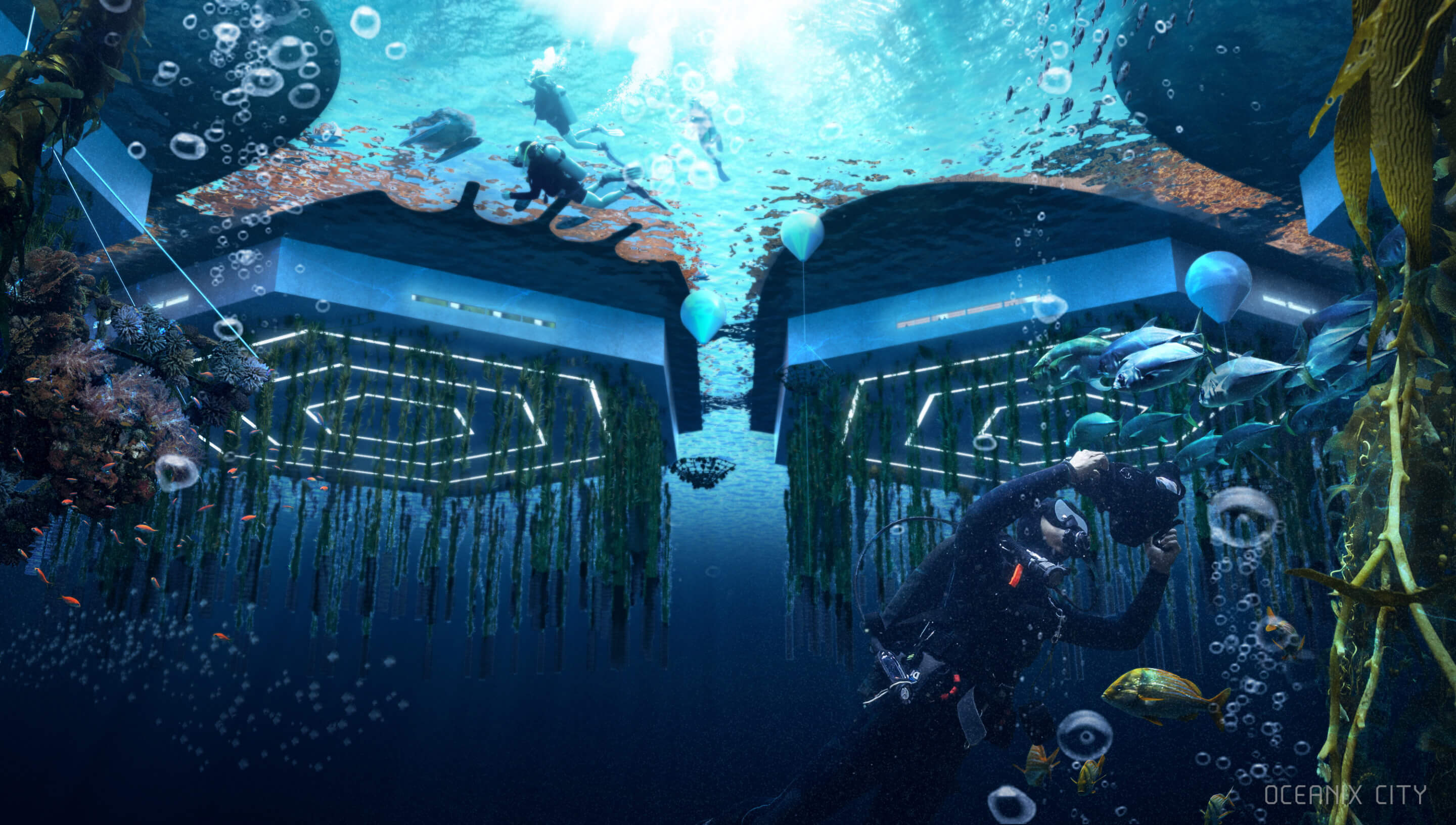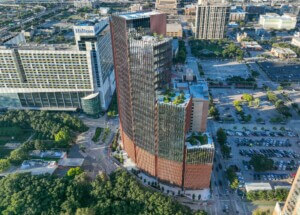Busan, a major South Korean city and maritime shipping hub best known to Westerners for its sports, hot springs, and zombie apocalypse associations, will be the future site of a United Nations-backed experimental floating city first revealed by the Bjarke Ingels Group (BIG), the Explorers Club, and the MIT Center for Ocean Engineering in 2019.
On November 18, The Busan Metropolitan City of the Republic of Korea, the Nairobi-headquartered United Nations Human Settlements Programme (UN-Habitat), and OCEANIX, a New York-based bluetech firm co-founded in 2018 by Itai Madamombe and Marc Collins Chen, announced the signing of a “historic agreement” to build a prototype natatory district within Busan’s bustling deep harbor. Located on the southeastern tip of the Korean Peninsula, Busan is South Korea’s second-most populous city with 3.4 million residents and is home to the fifth-largest container port in the world.
In its press release announcing the agreement, UN-Habitat didn’t provide a clear construction timeline for the ambitious, amphibious settlement that could house up to 10,000 people, who will take up residence on a series of hexagon-shaped modular floating platforms divvied into a half-dozen interlinked offshore “villages” impervious to rising seas and capable of withstanding major tropical storms. However, multiple media outlets have reported an anticipated 2025 completion date and that work will likely begin next year. The anticipated cost to realize the prototype, described by UN-Habitat as “a flood-proof infrastructure that rises with the sea and produces its own food, energy and fresh water with fully integrated zero waste closed-loop systems,” is $200 million, although that figure is likely to balloon.

Per UN-Habitat, OCEANIX has committed to executing the Busan prototype on a “hyper-local level” while taking into consideration the “rich social, economic, political and cultural uniqueness of Korea as the host country.” Speaking to Business Insider, Madamombe elaborated that a refined prototype, created in close collaboration with South Korean firms with expertise in major maritime projects, will be presented at a UN roundtable event next April; from there, the team will begin engineering the floating platforms and securing construction permits. She also said that OCEANIX is in talks with “at least” 10 other global governments to build floating cities.
“Sustainable floating cities are a part of the arsenal of climate adaptation strategies available to us. Instead of fighting with water, let us learn to live in harmony with it,” said Maimunah Mohd Sharif, executive director of UN-Habitat, in a statement. “We look forward to developing climate adaptation and nature-based solutions through the floating city concept, and Busan is the ideal choice to deploy the prototype.”
“With the complex changes facing coastal cities, we need a new vision where it is possible for people, nature and technology to co-exist,” added Busan Mayor Park Heong-joon.

While BIG was behind the conceptual design presented back in 2019 (a scale model of that design is currently on display at FUTURES, a new exhibition at the Smithsonian’s long-dormant Arts & Industries Building in Washington, D.C.) and is listed on the OCEANIX website as being part of the larger floating city-envisioning team, the firm is not listed in the recent announcement as a partner on the Busan prototype project. Named partners include: Prime Movers Lab, Helena, Arup, Olafur Eliasson and Studio Other Spaces, Bouygues Construction, Wartsila, Greenwave, Mobility in Chain, Sherwood Design Engineers, Agritecture, Center for Zero Waste Design, and the Global Coral Reef Alliance.
As detailed by UN-Habitat, the world’s coastal cities are “on the frontline of climate-related risks” as rapid urban population growth pushes residents closer to vulnerable waterfront areas that directly front the planet’s increasingly tempestuous seas. With many busting-at-the-seams cities running out of room to expand on terra firma, OCEANX has envisioned a utopian solution in the form of sustainable, self-sufficient overwater colonies that, as mentioned, are designed to float/stand strong during even the most severe, climate change-fueled weather events.
“Sea level rise is a formidable threat, but sustainable floating infrastructure can help solve this looming catastrophe,” elaborated Madamombe and Collins Chen in a joint statement. “We are excited to make history with Busan and UN-Habitat in ushering in humanity’s next frontier.”











